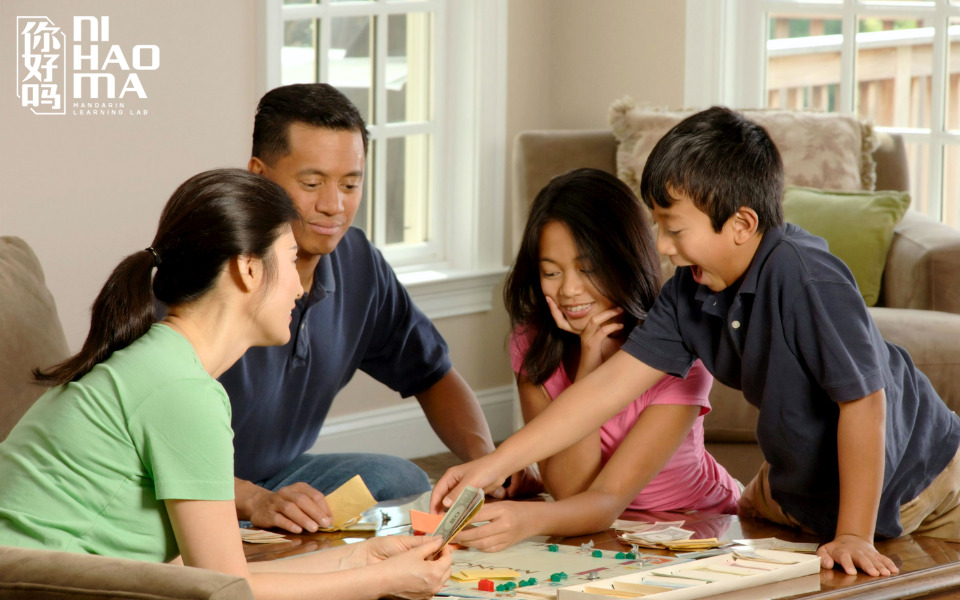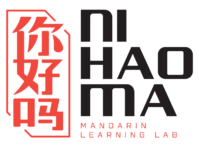Introducing your family in Chinese is one of the basic topics when starting to learn this language. In daily conversations, especially when first meeting someone, Chinese people often ask about your family as a way to show interest. Let’s explore in detail how to introduce your family in Chinese with Ni Hao Ma!
How to Introduce Your Family in Chinese
One of the basic yet important communication topics is introducing your family. In Chinese communication, introducing yourself and your family is a fundamental skill that helps you make a good impression from the first meeting. So, how exactly should you introduce your family in Chinese?
Introducing the Number of People in Your Family
To begin introducing your family, you need to let the listener know how many people are in your family. In Chinese, we commonly use the measure word 口 (kǒu) to count family members.
我家有 + Number + 口人 (kǒu rén)
Example:
我家有四口人,爸爸、妈妈、姐姐和我。
(Wǒ jiā yǒu sì kǒu rén, bàba, māma, jiějie hé wǒ.)
My family has four people: dad, mom, older sister, and me.

Introducing Ages
Introducing the ages of family members is also an interesting part of the conversation, helping the other person understand more about your family. When introducing the ages of family members in Chinese, you can use simple yet natural sentence structures. The most common structure is:
Family member + 今年 (jīnnián) + Number + 岁 (suì)
我爸爸今年四十五岁。
(Wǒ bàba jīnnián sìshíwǔ suì.)
My dad is 45 years old this year.
我弟弟今年十岁。
(Wǒ dìdi jīnnián shí suì.)
My younger brother is 10 years old this year.
Explore more: How To Count Numbers In Chinese Mandarin
Introducing the Occupations of Family Members
After mentioning the number of family members, you can continue by sharing the occupations of each family member. This also makes the conversation more interesting when communicating.
Family member + 是 (shì) + Job
我爸爸是医生。
(Wǒ bàba shì yīshēng.)
My dad is a doctor.
我妈妈是老师。
(Wǒ māma shì lǎoshī.)
My mom is a teacher.
我的哥哥是工程师。
(Wǒ de gēge shì gōngchéngshī.)
My older brother is an engineer.
Learn More: Vocabulary About Jobs And Occupations in Chinese
Sample Text to Introduce Your Family in Chinese
我家有四口人,爸爸、妈妈、妹妹和我。爸爸是医生,妈妈是老师,我和妹妹是学生。爸爸今年四十岁,妈妈三十六岁,妹妹十四岁。
Wǒ jiā yǒu sì kǒu rén, bàba, māma, mèimei hé wǒ. Bàba shì yīshēng, māma shì lǎoshī, wǒ hé mèimei shì xuéshēng. Bàba jīnnián sìshí suì, māma sānshíliù suì, mèimei shísì suì.
There are four people in my family: my father, mother, younger sister, and me. My father is a doctor, my mother is a teacher, and my sister and I are students. My father is 40 years old this year, my mother is 36 years old, and my younger sister is 14 years old.

Vocabulary Related to Family Members in Chinese
The journey to mastering Chinese is not just about memorizing grammar rules or practicing everyday conversations but also about exploring and expanding your vocabulary according to specific topics. Among these topics, family is always an essential one. Mastering vocabulary related to the family will help you introduce your family in Chinese more fluently.
Here’s a list of vocabulary related to family members and related terms that you can refer to!
| No. | Chinese | Pinyin | Meaning |
|---|---|---|---|
| 1 | 家庭 | jiātíng | Family |
| 2 | 父亲 | fùqīn | Father (formal) |
| 3 | 母亲 | mǔqīn | Mother (formal) |
| 4 | 爸爸 | bàba | Dad (informal) |
| 5 | 妈妈 | māmā | Mom (informal) |
| 6 | 爷爷 | yéye | Paternal grandfather |
| 7 | 奶奶 | nǎinai | Paternal grandmother |
| 8 | 外公 | wàigōng | Maternal grandfather |
| 9 | 外婆 | wàipó | Maternal grandmother |
| 10 | 兄弟 | xiōngdì | Brothers |
| 11 | 姐妹 | jiěmèi | Sisters |
| 12 | 哥哥 | gēge | Older brother |
| 13 | 弟弟 | dìdì | Younger brother |
| 14 | 姐姐 | jiějie | Older sister |
| 15 | 妹妹 | mèimei | Younger sister |
| 16 | 孙子 | sūnzi | Grandson |
| 17 | 孙女 | sūnnǚ | Granddaughter |
| 18 | 儿子 | érzi | Son |
| 19 | 女儿 | nǚ’ér | Daughter |
| 20 | 亲戚 | qīnqi | Relatives |
| 21 | 夫妻 | fūqī | Couple (husband and wife) |
| 22 | 丈夫 | zhàngfu | Husband |
| 23 | 妻子 | qīzi | Wife |
| 24 | 亲生 | qīnshēng | Biological (of birth) |
| 25 | 继父 | jìfù | Stepfather |
| 26 | 继母 | jìmǔ | Stepmother |
| 27 | 养父 | yǎngfù | Adoptive father |
| 28 | 养母 | yǎngmǔ | Adoptive mother |
| 29 | 姑姑 | gūgu | Aunt (father’s sister) |
| 30 | 舅舅 | jiùjiu | Uncle (mother’s brother) |
| 31 | 阿姨 | āyí | Aunt (mother’s sister) |
| 32 | 伯伯 | bóbo | Uncle (father’s older brother) |
| 33 | 叔叔 | shūshu | Uncle (father’s younger brother) |
| 34 | 媳妇 | xífù | Daughter-in-law |
| 35 | 岳父 | yuèfù | Father-in-law (wife’s father) |
| 36 | 岳母 | yuèmǔ | Mother-in-law (wife’s mother) |
| 37 | 孩子 | háizi | Child |
| 38 | 继兄弟姐妹 | jì xiōngdì jiěmèi | Step-siblings |
| 39 | 妯娌 | zhóulì | Sister-in-law (brother’s wife) |
| 40 | 小舅子 | xiǎo jiùzi | Brother-in-law (husband of sister) |
| 41 | 婶婶 | shěnshen | Aunt (wife of uncle) |
| 42 | 伯母 | bómǔ | Aunt (wife of father’s older brother) |
| 43 | 舅妈 | jiùmā | Aunt (wife of mother’s brother) |
| 44 | 姨夫 | yífu | Uncle (husband of aunt) |
| 45 | 继子女 | jì zǐ nǚ | Stepchildren |
| 46 | 儿媳 | érxí | Daughter-in-law |
| 47 | 女婿 | nǚxù | Son-in-law |
| 48 | 婆婆 | pópo | Mother-in-law (husband’s mother) |
| 49 | 公公 | gōnggong | Father-in-law (husband’s father) |
| 50 | 养子 | yǎngzǐ | Adopted son |
| 51 | 养女 | yǎngnǚ | Adopted daughter |
| 52 | 堂哥 | táng gē | Paternal cousin (older male) |
| 53 | 堂姐 | táng jiě | Paternal cousin (older female) |
| 54 | 表哥 | biǎo gē | Maternal cousin (older male) |
| 55 | 表姐 | biǎo jiě | Maternal cousin (older female) |
| 56 | 兄弟姐妹 | xiōngdì jiěmèi | Siblings |
| 57 | 家族 | jiāzú | Family (clan) |
| 58 | 长辈 | zhǎngbèi | Elder |
| 59 | 晚辈 | wǎnbèi | Younger generation |
| 60 | 孤儿 | gū’ér | Orphan |
| 61 | 结婚 | jiéhūn | To get married |
| 62 | 离婚 | líhūn | To divorce |
| 63 | 独生子 | dúshēngzǐ | Only son |
| 64 | 独生女 | dúshēngnǚ | Only daughter |
| 65 | 同父异母的哥哥 | tóng fù yì mǔ de gēge | Half-brother (same father, different mother) |
| 66 | 同母异父的姐姐 | tóng mǔ yì fù de jiějie | Half-sister (same mother, different father) |
| 67 | 嫂嫂 | sǎosǎo | Sister-in-law (brother’s wife) |
| 68 | 妹夫 | mèifu | Brother-in-law (husband of sister) |
| 69 | 姐夫 | jiěfu | Brother-in-law (husband of older sister) |
| 70 | 弟媳 | dìxí | Sister-in-law (wife of younger brother) |
Sample Dialogue for Introducing Your Family in Chinese
Mastering how to talk about family members not only makes your conversation more natural but also creates a friendly connection with the other person. Below are some simple dialogue examples you can use to learn how to introduce your family in Chinese smoothly.
Dialogue Sample 1
A: 你好!可以介绍一下你的家庭吗?
(Nǐ hǎo! Kěyǐ jièshào yīxià nǐ de jiātíng ma?)
Hello! Can you introduce your family?
B: 当然可以!我家有五口人,爸爸、妈妈、哥哥、妹妹和我。
(Dāngrán kěyǐ! Wǒ jiā yǒu wǔ kǒu rén, bàba, māma, gēge, mèimei hé wǒ.)
Of course! My family has five people: my dad, mom, older brother, younger sister, and me.
A: 你爸爸妈妈是做什么工作的?
(Nǐ bàba māma shì zuò shénme gōngzuò de?)
What do your parents do?
B: 爸爸是工程师,妈妈是护士。哥哥已经工作了,是一名律师,妹妹还在上高中。
(Bàba shì gōngchéngshī, māma shì hùshì. Gēge yǐjīng gōngzuò le, shì yì míng lǜshī, mèimei hái zài shàng gāozhōng.)
My dad is an engineer, my mom is a nurse. My older brother is working as a lawyer, and my younger sister is still in high school.

Dialogue Sample 2
A: 你好啊!我们好像是第一次见面吧?你是哪边的亲戚?
(Nǐ hǎo a! Wǒmen hǎoxiàng shì dì yī cì jiànmiàn ba? Nǐ shì nǎ biān de qīnqi?)
Hello! Looks like this is our first meeting? Which side of the family are you from?
B: 哈哈,是的。我是新娘的表弟。我家住在北京,爸爸是公务员,妈妈开了一家小店。
(Hāhā, shì de. Wǒ shì xīnniáng de biǎodì. Wǒ jiā zhù zài Běijīng, bàba shì gōngwùyuán, māma kāi le yī jiā xiǎodiàn.)
Haha, yes. I’m the groom’s cousin. My family lives in Beijing, my dad is a civil servant, and my mom runs a small shop.
A: 哦,难怪看着这么面熟,欢迎欢迎!
(Ó, nán guài kàn zhe zhème miànshú, huānyíng huānyíng!)
Oh, no wonder you look familiar. Welcome, welcome!
Conclusion
Introducing your family in Chinese is a basic topic that you will often encounter in various communication situations, especially when getting to know someone. Mastering the vocabulary and dialogue templates provided in this article will make it easier for you to converse with others. We hope Ni Hao Ma‘s helpful tips will guide you in introducing your family in Chinese with confidence!



